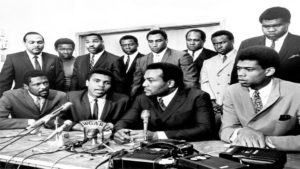
In a 1967 summit in Cleveland, Walter Beach III joined with other Black athletes to support Muhammad Ali’s refusal to be drafted into the United States military and serve in the Vietnam War. The cast of athletes included (clockwise from front row left) Bill Russell, Muhammad Ali, Jim Brown, Lew Alcindor; (back row) Carl Stokes, Walter Beach III, Bobby Mitchell, Sid Williams, Curtis McClinton, Willie Davis, Jim Shorter, and John Wooten. (Getty Images, Robert Abbott Sengstacke)
Current NFL protests, ignited by former San Francisco 49ers quarterback Colin Kaepernick, have drawn comparisons to the activist Black athletes of the 1960s. Heavyweight champion Muhammad Ali and countless other sports titans sacrificed their professional careers, financial security, and personal safety to stand with Black people against racism. More than fifty years before kneeling during the national anthem became the rage, Walter Beach III made that sacrifice.
A defensive back on the 1964 NFL champion Cleveland Browns, Beach says his family displayed and passed on the courage required to support justice and defend Black people. Beach proudly recalls his grandmother, Ola, telling him about how his grandfather was a “race man.” The elder Beach reportedly toted a firearm so that his wife Ola could walk the sidewalk, defying racist codes that demanded Black pedestrians trek through mud.
This cultural inheritance demanded that Beach refuse to accommodate racism for the sake of playing professional ball. In 1962, he formally challenged the Boston Patriots’ separate and unequal lodging policy, which insisted Black players receive shoddy and remote hotels. As opposed to equal lodging, Beach says the franchise that became Tom Brady’s beloved New England Patriots gave him “a plane [ticket] and per diem and sent [him] home.”
Undaunted, Beach remained committed to the craft of football and the spirit of resistance. The following season, he joined Hall of Fame running back and lifetime activist Jim Brown in Cleveland and the club won the league crown a year later. Like Kaepernick, Beach was nearly axed from the championship roster.
Browns owner Art Modell, who years later absconded with the team to Baltimore, modeled the plantation ideals designed to maintain white power. Reminiscent of enslaved Black people who were deliberately kept illiterate under penalty of death, Beach jeopardized his football career by openly reading Elijah Muhammad’s “Message to the Blackman in America.” According to Beach, Modell tongue-lashed him and placed Muhammad’s “Message” on the banned book list.
Speaking with Atlanta Black Star, Beach said he told his boss: “A man can’t tell another man what to read. … If you don’t want me on this football team, give me my flight ticket back. Don’t you ever think you own me and you can tell me what to read. And of course, that was the end of that discussion.”
Jim Brown, the best player in the league, shielded his friend and teammate from Modell’s punitive acts. But Brown, too, clashed with white owners, and he retired abruptly after the 1965 season. With his touchdown-scoring ally absent, Beach lasted one season before being fired from the Browns and was never employed to play professional football again.
In 1971, Walter Beach III sued the Cleveland Browns and the National Football League for wrongfully denying him employment. The retired gridiron star sees a parallel with his football career and the exiled Kaepernick. He thinks the quarterback remains banished to exemplify that white owners maintain dominion over the predominantly Black league.

A half century after Walter Beach III, former San Francisco quarterback Colin Kaepernick continues to be shut out from the NFL. (Facebook)
Beach told Atlanta Black Star that the daily operations of racism are on display in how Kaepernick’s message has been diminished even as the kneeling spreads. “The whole movement has been hijacked. Kaepernick was talking about police brutality. Kaepernick said, I’m standing because I object to young Black men and women getting murdered by the police, and you have not heard a word about [that]. They’re talking about the First Amendment, the Constitution, veterans.”
Similar to Jim Brown and baseball legend Jackie Robinson, Beach served in the military before his pro sports career. Even after four years in the United States Air Force, Beach staunchly rejects claims that declining to rise for the national anthem disparages the military.
Displaying remarkable consistency, Beach took the same position fifty years ago, when confronted with a young prizefighter who refused to be drafted for the Vietnam War. In 1967, Muhammad Ali gathered with Jim Brown, basketball icons Bill Russell and Kareem Abdul-Jabbar, and a small cadre of other Black athletes including Walter Beach III. Ali’s refusal to travel across the globe to battle people who “never called me nigger,” resonated with generations of Black people including Beach, who couldn’t say that his white Air Force comrades had the same unblemished record on racial slurs.
Since Ali’s death last year, Beach says he’s most dissatisfied with the hypocrisy and feigned adoration for the boxing prodigy and former student of Elijah Muhammad. Beach, now 84, insists “White folks wasn’t impressed with Ali. All them congressmen and senators that went to the funeral and all of those individuals talking about what a great man he was, in 1968, that wasn’t their position. He was a Black nationalist, militant, Muslim and they didn’t like him.”
Witnessing decades of Black athletes commodified and disposed of for sporting amusement compelled Beach to warn sportsmen to anchor their self-worth beyond the playing field. “If you’re with the Warriors, or with Cleveland, or with the Rams, football is what you do. That ain’t who you are. Football is what I did, but that ain’t who I am.”
The author and NFL champion says many questions if he would have changed his behavior if he had been earning the multi-millions that today’s athletes garner. Beach again returned to family. His father, Walter Beach Jr., often reminded his son: “You make money, money don’t make you.” He hopes more Black people develop the courage to live their values even when it costs.
Gus T. Renegade hosts “The Context of White Supremacy” radio program, a platform designed to dissect and counter racism. For nearly a decade, he has interviewed and studied authors, filmmakers and scholars from around the globe.


